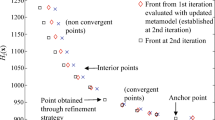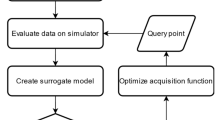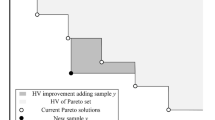Abstract
In this work, a design optimisation strategy is presented for expensive and uncertain single- and multi-objective problems. Computationally expensive design fitness evaluations prohibit the application of standard optimisation techniques and the direct calculation of risk measures. Therefore, a surrogate-assisted optimisation framework is presented. The computational budget limits the number of high-fidelity simulations which makes impossible to accurately approximate the landscape. This motivates the use of cheap low-fidelity simulations to obtain more information about the unexplored locations of the design space. The information stemming from numerical experiments of various fidelities can be fused together with multi-fidelity Gaussian process regression to build an accurate surrogate model despite the low number of high-fidelity simulations. We propose a new strategy for automatically selecting the fidelity level of the surrogate model update. The proposed method is extended to multi-objective applications. Although, Gaussian processes can inherently model uncertain processes, here the deterministic input and uncertain parameters are treated separately and only the design space is modelled with a Gaussian process. The probabilistic space is modelled with a polynomial chaos expansion to allow also uncertainties of non-Gaussian type. The combination of the above techniques allows us to efficiently carry out a (multi-objective) design optimisation under uncertainty which otherwise would be impractical.







Similar content being viewed by others
Notes
Polynomial Chaos Expansion can be considered as a particular subclass of Gaussian process regression with particular regression functions and Kronecker delta covariance function (Schobi et al. 2015).
It is also possible to construct a multi-output GP. However, the training of a multi-output GP is challenging as a kernel should be found which can capture the correlation of both the input and output space (Press William et al. 2007).
For maximisation the appropriate signs must be changed.
References
Alexandrov N et al (2000) Optimization with variable-fidelity models applied to wing design. In: 38th Aerospace sciences meeting and exhibit
Bandler JW (1969) Optimization methods for computer-aided design. IEEE Trans Microw Theory Tech 17(8):533–552
Beyer H-G, Sendhoff B (2007) Robust optimization-a comprehensive survey. Comput Methods Appl Mech Eng 196(33–34):3190–3218
Choi S-K et al (2004) Polynomial chaos expansion with latin hypercube sampling for estimating response variability. AIAA J 42(6):1191–1198
Deb K et al (2005) Scalable test problems for evolutionary multiobjective optimization. Evolutionary multiobjective optimization. Springer, Berlin
Emmerich MTM, Giannakoglou KC, Naujoks B (2006) Single-and multiobjective evolutionary optimization assisted by Gaussian random field metamodels. IEEE Trans Evolut Comput 10(4):421–439
Fernández-Godino GM et al (2019) Issues in deciding whether to use multifidelity surrogates. AIAA J 57(5):2039–2054
Forrester AIJ, Sóbester A, Keane AJ (2007) Multi-fidelity optimization via surrogate modelling. In: Proceedings of the royal society a: mathematical, physical and engineering sciences
Forrester A, Sobester A, Keane A (2008) Engineering design via surrogate modelling: a practical guide. Wiley, New York
Giering R, Kaminski T (1998) Recipes for adjoint code construction. ACM Trans Math Softw (TOMS) 24(4):437–474
Habib A, Singh HK, Ray T (2019) A multiple surrogate assisted multi/many-objective multi-fidelity evolutionary algorithm. Inf Sci 502:537–557
Han ZH, Görtz S, Zimmermann R (2013) Improving variable-fidelity surrogate modeling via gradient-enhanced Kriging and a generalized hybrid bridge function. Aerosp Sci Technol 25:177–189
Jones DR, Schonlau M, Welch WJ (1998) Efficient global optimization of expensive black-box functions. J Glob Optim 13:455–492
Keane AJ (2006) Statistical improvement criteria for use in multiobjective design optimization. AIAA J 44(4):879–891
Kennedy MC, O’Hagan A (2000) Predicting the output from a complex computer code when fast approximations are available. Biometrika 87(1):1–13
Knowles J (2006) ParEGO: a hybrid algorithm with on-line landscape approximation for expensive multiobjective optimization problems. IEEE Trans Evolut Comput 10(1):50–66
Kuehl RO (2000) Design of experiments: statistical principles of research design and analysis, 2nd edn. Duxbury Press, Belmont, CA
Lam R et al. (2018) Advances in Bayesian optimization with applications in aerospace engineering. In: 2018 AIAA non-deterministic approaches conference
Le Gratiet L (2013) Multi-fidelity Gaussian process regression for computer experiments. Diss. Université Paris-Diderot-Paris VII
Lemieux C (2009) Monte carlo and quasi-monte carlo sampling. Springer, Berlin
Meliani M et al (2019) Multi-fidelity efficient global optimization: methodology and application to airfoil shape design. In: AIAA aviation 2019 forum
Poloczek M, Jialei W, Peter F (2017) Multi-information source optimization. In: Advances in neural information processing systems
Press WH et al (2007) Numerical recipes: the art of scientific computing, 3rd edn. Cambridge University Press, Cambridge
Quagliarella D, Petrone G, Iaccarino G (2014) Optimization under uncertainty using the generalized inverse distribution function. In: Fitzgibbon W, Kuznetsov YA, Neittaanmäki P, Pironneau O (eds) Modeling, simulation and optimization for science and technology. Springer, Dordrecht, pp 171–190
Rasmussen CE (2004) Gaussian processes in machine learning. In: Bousquet O, von Luxburg U, Rätsch G (eds) Advanced lectures on machine learning. ML 2003. Lecture Notes in Computer Science, vol 3176. Springer, Berlin, Heidelberg
Rockafellar T, Royset J (2015) Engineering decisions under risk averseness. ASCE-ASME J Risk Uncertain Eng Syst A Civ Eng 1(2):04015003
Rockafellar T, Uryasev S (2002) Conditional value-at-risk for general loss distributions. J Bank Finance 26:1443–1471
Schobi R, Sudret B, Wiart J (2015) Polynomial-chaos-based kriging. Int J Uncertain Quantification 5(2):171–193
Skinner SN, Zare-Behtash H (2018) State-of-the-art in aerodynamic shape optimisation methods. Appl Soft Comput 62:933–962
Tinkle C et al (2019) A survey on handling computationally expensive multiobjective optimization problems with evolutionary algorithms. Soft Comput 23(9):3137–3166
Wang H, Jin Y, Doherty J (2017) A generic test suite for evolutionary multifidelity optimization. IEEE Trans Evolut Comput 22(6):836–50
Yang X-S (2014) Nature-inspired optimization algorithms. Elsevier, Amsterdam
Acknowledgements
This work was partially supported by the H2020-MSCA-ITN-2016 UTOPIAE, Grant Agreement 722734.
Author information
Authors and Affiliations
Corresponding author
Additional information
Publisher's Note
Springer Nature remains neutral with regard to jurisdictional claims in published maps and institutional affiliations.
Rights and permissions
About this article
Cite this article
Korondi, P.Z., Marchi, M., Parussini, L. et al. Multi-fidelity design optimisation strategy under uncertainty with limited computational budget. Optim Eng 22, 1039–1064 (2021). https://doi.org/10.1007/s11081-020-09510-1
Received:
Revised:
Accepted:
Published:
Issue Date:
DOI: https://doi.org/10.1007/s11081-020-09510-1




